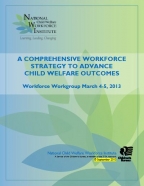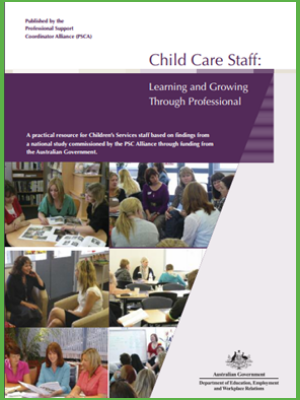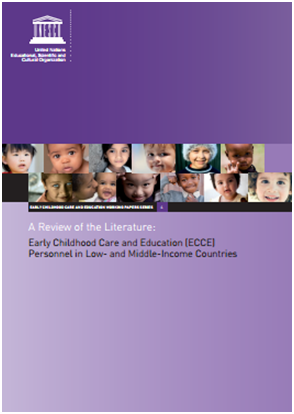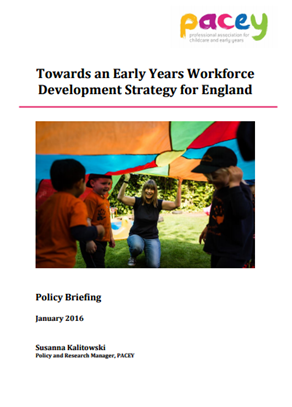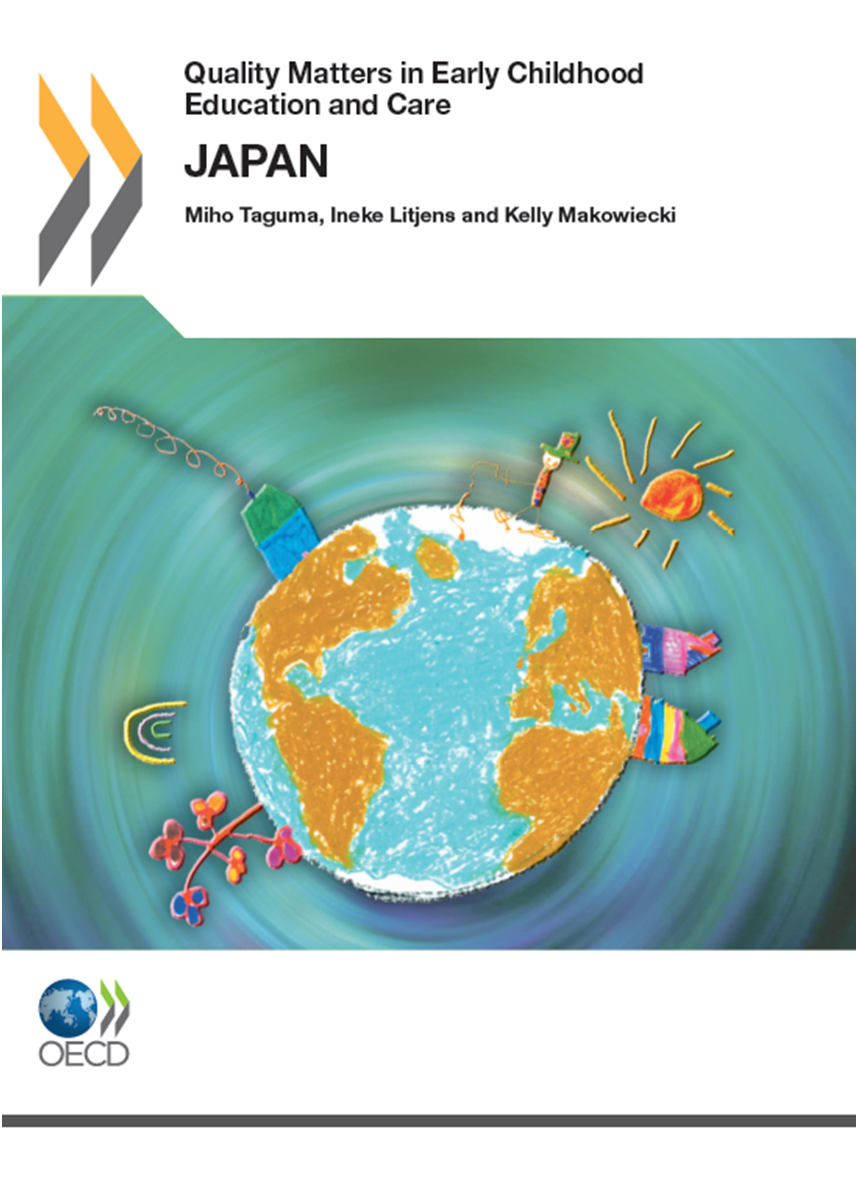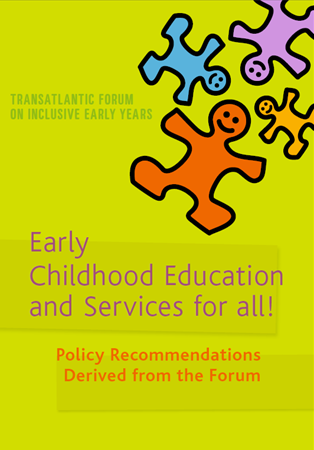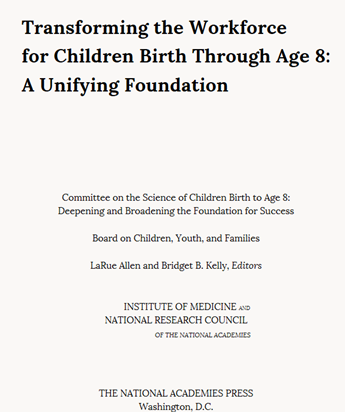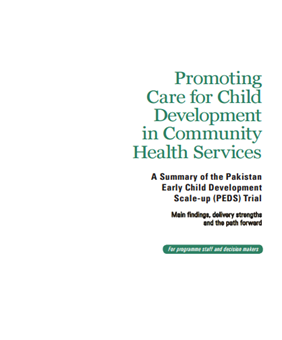Training & professional development
Summary:
For a child welfare agency to achieve its mission, it must attract, develop, and retain a skilled and ready workforce. Yet, child welfare agencies across the country are struggling to recruit, hire, train, support, and retain committed and high-performing staff. To hear key stakeholder concerns about the child welfare workforce, the Children’s Bureau and the National Child Welfare Workforce Institute invited 28 state and county agency leaders and 7 university partners, Children’s Bureau staff and national consultants to participate in a Workforce Workgroup on March 4-5, 2013. This report is a compilation of the most pressing child welfare workforce issues they face and recommended strategies for developing the child welfare workforce of the future.
Summary:
Child Care Staff: Learning and Growing Through Professional Development offers insights and shares innovative practices about the current professional development and support activities currently offered to the Australian early childhood workforce.
Drawing on the views and experience of 684 child care service directors/managers/owner-operators and staff across Australia, this publication aims to answer questions about how professional development impacts children’s outcomes and the measures of effective support services.
Summary:
A Review of the Literature: Early Childhood Care and Education (ECCE) Personnel in Low- and Middle-Income Countries was commissioned to inform the development of a common survey instrument for the UNESCO pilot Survey of Teachers in Pre-Primary Education (STEPP) which will collect data on Early Childhood Care and Education (ECCE) personnel in selected low- and middle income countries (LMICs). The authors address three questions in this literature review:
- What is the evidence on the relationship among personnel characteristics, the quality of ECCE services and child outcomes?
- What are the training requirements, working conditions, setting characteristics of ECCE personnel in LMICs? What beliefs do these personnel hold?
- What are the trends and main issues surrounding the above-mentioned characteristics and their implications for access and quality?
Summary:
The quality and qualifications of the childcare and early years workforce are steadily improving and have never been better. But the sector has reached tipping point, with increasing evidence that early years practitioners are severely under strain.
The public funding environment is set to remain challenging over the next five years. However the substantial investment in early education and childcare that is being made through the Tax-Free Childcare scheme and the doubling of the free childcare entitlement for working families provides a vital opportunity to support workforce development. This briefing makes a series of practical recommendations, many of which do not require additional public funding, which seek to remove barriers to entry and progression and support the sector to retain and make the most of the talented individuals already working in childcare and early years.
Summary:
ECEC professionals’ qualifications and working conditions are inseparably linked to the quality of education and care children receive. This series of reports present why do workforce qualifications, education, training and working conditions matter for better child development. Each of the reports also describe where each of the respective countries (Slovak Republic, Japan and Finland) stand compared to other countries in terms of workforce qualifications, training and working conditions, what are the challenges they face and what strategies have been employed in order to address those challenges.

Summary:
Early Years Workforce Strategy is the early childhood education and care workforce strategy for Australia from 2012 through 2016. It sets out a vision agreed upon by Australian governments, which aims to build and support the early childhood education and care profession. The strategy aims to guide governments, as well as the sector as a whole, to: deliver a sustainable, highly qualified and professional workforce; foster a flexible and responsive workforce capable of identifying and delivering services in response to the needs of children and families; and support ECEC staff to work in a more integrated way with the broader early childhood development (ECD) workforce including the range of professionals that work with children and their families across health and family services. The following five priority areas have been identified as essential components of achieving a sustainable and highly qualified ECEC workforce: 1) a professional workforce; 2) a growing workforce; 3) a qualified workforce; 4) a responsive workforce; and 5) a collaborative workforce.
The strategy which builds on 2009’s Investing in the Early Years –A National Early Childhood Development Strategy, reflects a commitment by governments to address the immediate priorities for the ECEC workforce, and at the same time working towards a long-term broader strategy for the workforce with a focus on supporting more integrated ways of working across the ECD sector.
Commissioned By:
Standing Council on School Education and Early Childhood
Year of Publication:
2012
Summary:
Ultimately, high-quality ECEC services must not only be accessible, affordable, and available, but also desirable and relevant to all families and responsive to changing demographics and evolving needs in order to be successful.
The recommendations that follow are intended to provide a comprehensive set of guiding principles for policymaking at the local, national, and federal levels, as well as for funders and other stakeholders, and are based on the knowledge generated from the Transatlantic Forum on Inclusive Early Years’ (TFIEY) convenings. While these recommendations are focused on issues in ECEC that may particularly impact children in a low-income or migrant context, they are considerations that can benefit all young children and families in ECEC systems across the EU and US regardless of their background. Investing in inclusive, high-quality ECEC is a win-win situation: for all children and their families and for society.
Summary:
Young children thrive and learn best when they have secure, positive relationships with adults who are knowledgeable about how to support their development and learning and are responsive to their individual progress.
Transforming the Workforce for Children Birth Through Age 8 offers guidance on system changes to improve the quality of professional practice, specific actions to improve professional learning systems and workforce development, and research to continue to build the knowledge base in ways that will directly advance and inform future actions. The recommendations of this book provide an opportunity to improve the quality of the care and the education that children receive, and ultimately improve outcomes for children.
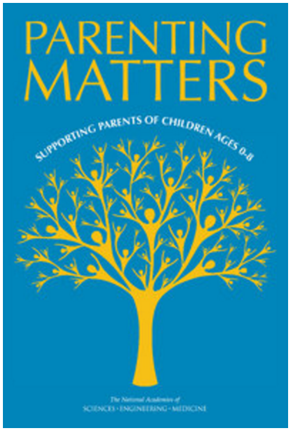
Summary:
Decades of research have demonstrated that the parent-child dyad and the environment of the family—which includes all primary caregivers—are at the foundation of children's well- being and healthy development. From birth, children are learning and rely on parents and the other caregivers in their lives to protect and care for them. The impact of parents may never be greater than during the earliest years of life, when a child's brain is rapidly developing and when nearly all of her or his experiences are created and shaped by parents and the family environment.
Parenting Matters identifies parenting knowledge, attitudes, and practices associated with positive developmental outcomes in children ages 0-8; universal/preventive and targeted strategies used in a variety of settings that have been effective with parents of young children and that support the identified knowledge, attitudes, and practices; and barriers to and facilitators for parents' use of practices that lead to healthy child outcomes as well as their participation in effective programs and services. This report makes recommendations directed at an array of stakeholders, for promoting the wide-scale adoption of effective programs and services for parents and on areas that warrant further research to inform policy and practice. It is meant to serve as a roadmap for the future of parenting policy, research, and practice in the United States.
